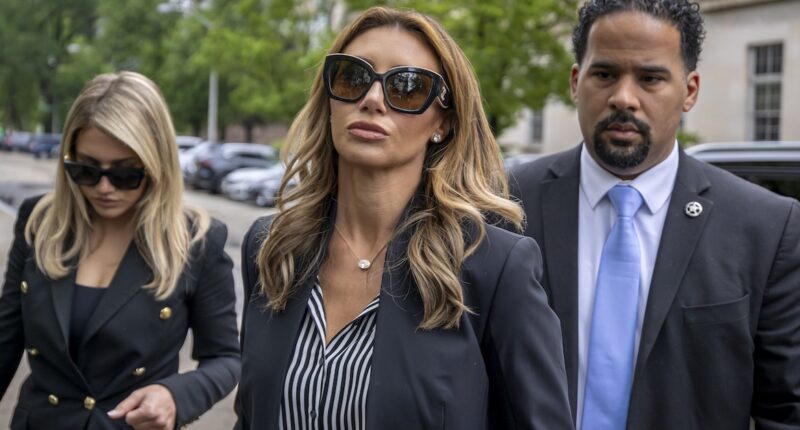Share this @internewscast.com
NEWARK, NEW JERSEY – MAY 15: Alina Habba, Acting U.S. Attorney for the District of New Jersey, arrives at the courthouse for Mayor of Newark, Ras Baraka’s hearing on May 15, 2025, in Newark, New Jersey (Sipa via AP Images).
The DOJ is vigorously defending Alina Habba’s role as acting U.S. attorney for New Jersey, appealing to overturn her disqualification from prosecuting criminal cases after some defendants successfully contested the legitimacy of her appointment.
The Department of Justice highlighted that the 3rd U.S. Circuit Court of Appeals’ forthcoming decision could impact seven additional cases in New Jersey, besides those against Julien Giraud Jr., Julien Giraud III, and Cesar Pina. It argued that the Chief U.S. District Judge for the Middle District of Pennsylvania, Matthew Brann, was mistaken in August when he prevented Habba from prosecuting those challengers, asserting she was not “lawfully executing the functions and duties of the office of the United States Attorney for the District of New Jersey.”
Appointed as interim U.S. attorney in March, Habba, a loyal ally of Donald Trump and his former personal lawyer, had a 120-day temporary term unless confirmed by the Senate or appointed by a court. When her nomination stalled in the Senate and her interim term drew to a close in July, federal judges chose not to appoint her, instead naming her then-first assistant, Desiree Grace, as U.S. Attorney.
U.S. Attorney General Pam Bondi claimed “politically motivated” and “rogue judges” had disrupted Trump’s “core Article II powers,” promptly dismissing Grace. Following Trump’s withdrawal of Habba’s nomination as a permanent U.S. attorney, Habba stepped down as interim U.S. attorney and was simultaneously appointed to the first assistant’s position under the Federal Vacancies Reform Act (FVRA), restoring her as top prosecutor. To counter potential legal challenges, Habba was also appointed as a “Special Attorney to the United States Attorney General,” under a federal statute regarding special attorneys, empowering her to function as a U.S. attorney.
The Girauds and Pina challenged Habba’s authority, mirroring actions taken by defendants in other states questioning similar acting U.S. attorney appointments by Trump.
In his ruling, Brann declined to toss out the Girauds’ and Pina’s indictment, but he still found the executive branch had used “a novel series of legal and personnel moves” to keep Habba in place and that she was not “lawfully performing the functions and duties” of the office she claimed. He further ordered Habba disqualified from “engaging in the prosecutions of the Girauds and Mr. Pina, and from supervising the same.”
The judge, adding that the same would apply to “[a]ny Assistant United States Attorney” coming to court under Habba’s authority or supervision, ruled that at its most “extreme,” Trump and Bondi had claimed a power with “historical practice” to permanently sidestep the Senate and indefinitely install anyone “of his personal choice for an entire term.”
“Inferring Congress’s acquiescence from a historical record this thin and contradictory is simply untenable,” said Brann.
The DOJ stated Friday that Brann “erroneously disqualified” Habba and that the decision may “upend widespread and longstanding executive practice.”
Calling the case an “unusual situation” where a federal court declined to appoint Habba and “could not agree” with Trump “on the best person for the job,” the DOJ said Brann “erred” in embracing an “unprecedentedly narrow view of who can serve as an acting official under the FVRA.” The judge also wrongly held that AG Bondi “cannot delegate her concurrent or independent authority” to put Habba in a supervisory role over the U.S. Attorney’s Office, the brief said.
Making the case that Habba was lawfully appointed as first assistant following Grace’s firing, the DOJ said Brann’s “contrary conclusion” has serious implications for both past acting appointments spanning decades and future appointments.
“The district court’s contrary conclusion would mean that every presidential administration for more than two decades has unlawfully installed dozens of acting officials—a consequence that the district court openly embraced,” the brief said, before stating that Brann threatens to “cripple the functioning of government” in another way: not being able to lawfully fill vacancies temporarily in some “1,000 offices in the Executive Branch that require appointment by the President and confirmation by the Senate (‘PAS’ offices).”
“The district court’s holding also conflicts with longstanding executive practice that has been accepted by every branch of the federal government and would cripple the functioning of government when a PAS office is vacant and no acting official may lawfully serve,” the brief argued. “It is important that a DOJ component is overseen by someone who has the support of the Executive Branch, and that a U.S. Attorney’s Office can continue to function even when there is no Senate-confirmed or interim U.S. Attorney.”
“The district court’s contrary holdings misread the FVRA and would upend widespread and longstanding executive practice across the federal government. The district court’s disqualification orders should be reversed,” the DOJ concluded.
















